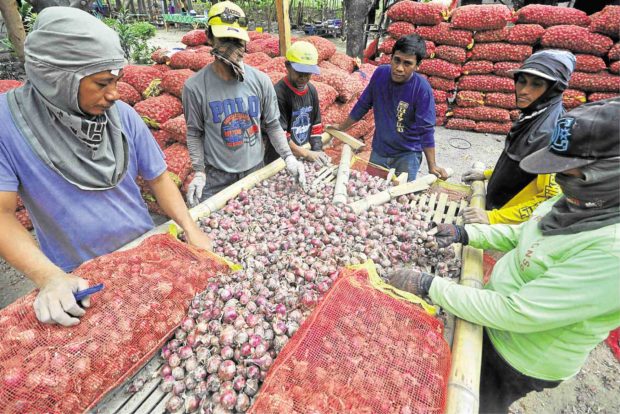
Farmers classify and sort newly harvested onions before these are transported to local markets or stored in warehouses. —WILLIE LOMIBAO
CABANATUAN CITY—Onion production in Nueva Ecija province, which supplies 54 percent of the country’s annual output, has been reduced by almost half due to armyworm infestations that may force the government to import to stabilize supply and prices.
The rate of destruction by armyworms on onion farms is from 40 to 45 percent, according to Gregorio Quiñones, high value crops coordinator of Nueva Ecija agriculture office.
Quiñones said his office had advised farmers to harvest the bulbs even though these were not yet fully matured so as not to lose much.
He said the 14 towns and five cities in the province that planted onions this season had been invaded by armyworms. With a total area of 9,000 hectares, the estimated onion harvest of 73,000 metric tons may go down to 43,000 MT.
Every farmer affected by the infestation has been unable to recoup production costs of P150,000 a hectare.
“There are multitudes of worms which are immune to any kind of chemicals used to combat them,” said Quiñones. “In the past, armyworm butterflies laid only 50 to 150 eggs from where the destructive larvae emerged, but now each butterfly produces thousands of eggs,” he said.
According to him, changing weather patterns, characterized by short interludes of rain and hot spell, have become conducive to the growth of pests that feed on onions.
Pest control officers also said the indiscriminate use of pesticides and insecticides has killed insects that protect the plants.
“Nakakakilabot (It’s hair-raising),” said Quiñones, describing the sea of worms gobbling up the leaves of onions they attack.
But supplies could be buttressed by onion harvests in May as other growers planted late, he said.
He said another consolation for farmers has been the short-term profits due to higher onion prices, with red onion now bought at P43 a kilogram and yellow granex at P25 a kilo.
According to Department of Agriculture studies, the average supply of onions was 130,452 MT while the average import was 28,986 MT.
With the expected reduction in output this year, analysts said a much bigger volume of onion importation was expected. The government would need to look for alternative ways to control the pest, they said. —ANSELMO ROQUE